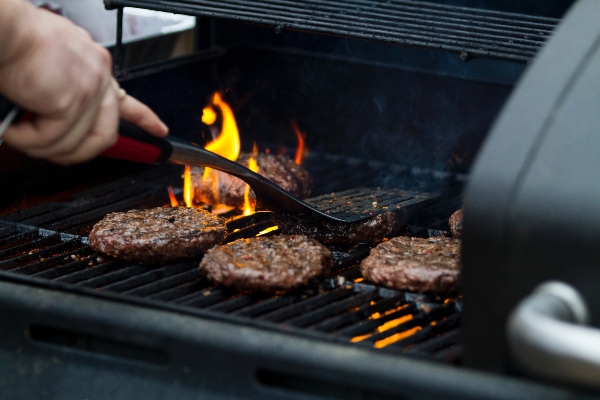For Healthy Autumn Meals
By Nicole Rogers, MPH, CHES, Executive Director of The Health Collaborative
It’s a mild South Texas autumn, and one great way to enjoy the outdoors is to grill. Unfortunately, recent research has linked grilled meat to cancer causing agents. This season, re-think grilling so that, instead of increasing the risk of cancer, you use grilling to prepare healthy autumn meals.
Grilling any meat — red, white or fish — produces potent carcinogens, according to studies conducted by the American Institute of Cancer Research. Carcinogens are mutagens, substances that change the genetic code of cells. Heterocyclic amines (HCAs), chemicals linked to cancer, are formed when high cooking temperatures cause a chemical reaction between naturally occurring amino acids and sugars in the meat and creatine, which is found in muscle tissue.
Another form of cancer causing agents, polycyclic aromatic hydrocarbons (PAHs), are found in the smoke created when fat and juices from meats drip and hit the heat source. The smoke rises and can stick to the meat. A one-pound, well done, charcoal-broiled steak contains 4 to 5 micrograms of the PAH benzopyrene, an amount equal to what a person would get from smoking 600 cigarettes. That’s a lot of carcinogens!
Both gas and charcoal grilling have the same effect. Cooking inside on a stove, whether in a frying plan, a grill pan or in the oven, is not known to cause the same reactions because the meats cook at far lower temperatures.
But don’t despair, just be aware when grilling and enjoy your family time outside.
Here are tips for healthy grilling this fall:
Choose lean meats. Decreasing the amount of fat that’s able to drip down on the coals also decreases carcinogens.
Marinate. Studies show that marinating your meats before putting them on the grill can reduce the HCAs as much as 92 to 99 percent in some cases. Marinate in a thin, liquid sauce for at least ten minutes.
Microwave first. Partially cook burgers, poultry, ribs and fish in a microwave oven for at least ten minutes before grilling.
Add soy. Add ½ cup of textured soy protein to a pound of ground meat before grilling. This cuts 95 percent of HCAs.
Add garlic and herbs. Garlic, rosemary and sage reduce HCAs when mixed into burgers.
Avoid well done meat. The longer you cook meat at high temperatures, the more HCAs you produce. If you cook a steak well done as opposed to medium well, you double the HCAs.
Add vitamin E. Just 120 milligram of vitamin E power mixed into or sprinkled on 3.5-ounce patties can reduce HCA formation as much as 72 percent.
Drink tea. Chemicals in black and green tea help detoxify HCAs. Drink hot or iced tea from bags or loose tea with your barbecue. Bottled teas or powdered, instant teas are not beneficial.
Cut your meat. Smaller cuts of meat that can be skewered, such as for kabobs, take less time to cook.
Avoid blackened or burned meat.
Grill fruits and veggies. Fruits and vegetables do not contain creatine, the animal protein needed to make HCAs. Pineapple and peppers are good when grilled. In addition, eating fruits, vegetables and green salads along with barbecued meats lessens the cancer risk.
A cutting-edge, public-private model for solving community health issues, The Health Collaborative began informally in 1997 when several area health care organizations agreed to put aside their competitive business practices to conduct the first community health assessment. The mission of the organization is to improve the health status of the community through collaborative means. Representatives of this group are dedicated to the health and well-being of our community in the spirit of collaboration. Partners include the major health systems in San Antonio, Metro Health, the YMCA of Greater San Antonio, Community First Health Plans, Methodist Healthcare Ministries, and a community representative. For more information, visit www.healthcollaborative.net .






